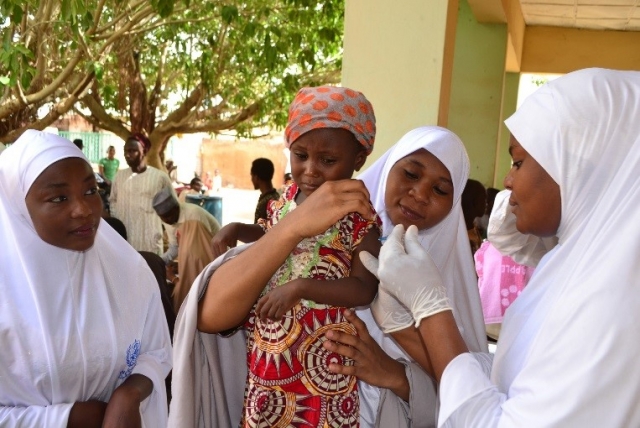
Abuja 29 June 2017 - Nigeria’s Minister of Health, Professor Isaac Adewole on 28 June 2017, officially declared the Meningitis outbreak over. The declaration was made after the weekly Federal Executive Council meeting with the Acting President, Professor Yemi Osinbajo and all serving ministers at the State House in Abuja.
Nigeria achieved the feat with the active support of the World Health Organization (WHO) and other development partners such as the Centers for Disease Control (USA) as contained in an earlier acknowledgment by the Chief Executive Officer of the Nigeria Center for Disease Control (NCDC), Dr Chikwe Iheakwezu.
“In the last four weeks, no local government area has reached outbreak alert threshold. By the 16th of June 2017 when the Emergency Operation Center (EOC) was stepped down, a total of 14,518 suspected cases of meningitis were reported from 25 states, with 1,166 deaths, giving a case fatality rate of 8%”, he added.
Since the outbreak in late 2016, the meningitis infection has claimed over 1,000 lives with Zamfara, Sokoto, Yobe, Katsina, Kano, Kebbi and Niger states being the most affected. The Nesseria meningitidis type C serotype was the predominant strain isolated.
Incident Management System for curtailing spread.
From the onset of the outbreak, WHO set up an Incident Management System (IMS) at the country office in Abuja and immediately provided guidelines and Standard Operating Procedures for enhanced surveillance, preparedness and response to CSM outbreak, managing meningitis epidemic to the EOC/NCDC. The Organization also provided technical support EOC/NCDC and EOCs of states (Sokoto, Zamfara, Yobe and Katsina), mainly on the 3-pillar strategy (surveillance, case management and vaccination).
The IMS was supervised by Dr Wondimagegnehu Alemu the WHO country Representative(WR) to Nigeria, and made up of components including Information and planning; Health Expertise and Operations; Management and Administration, Partnership, Resource Mobilization, and External Relations; Communication and Logistics.
Combined efforts to save lives
During the course of the outbreak, additional medicines and commodities were procured and distributed to the affected states. WHO supported NCDC to deploy 10 teams of healthcare workers to Zamfara and Sokoto states over a period of 3 weeks as well as training of clinicians on case detection and management.
Miss Chinyere Obidiegwu, a National Youth Corps member serving at a Government Secondary School in Birnin Magaji Local Government Area (LGA) in Zamfara State where meningitis broke out survived the deadly disease. In her words, “I took ill with severe headache and fever, and treated for malaria. Before I knew it, they said I fainted and was unconscious”. It was in the hospital where she was confirmed of being afflicted with meningitis and sent to the isolation camp for treatment.
“Notwithstanding all the pains I was going through, I never lost hope as I battled for life. My confidence was boosted by the activities of personnel from WHO and the treatment I got in the health facility where I was on admission”, Obidiegwu added.
The arduous road to containing the deadly strain of meningitis was facilitated by WHO as it supported government to stockpile and pre-position antibiotics, vaccines, laboratory reagents including Pastorex, TI media and lumbar puncture kits at both state and LGA levels.
Furthermore, over 10,000 personnel of the polio infrastructure were involved in combatting the CSM in Nigeria. In Zamfara state alone, 2454 polio personnel were engaged during the reactive vaccination campaign.
“The polio infrastructure was originally designed towards achieving the polio eradication goals,” said Dr Wondimagegnehu Alemu, the WR. “Now polio infrastructure is built into the Nigerian health system and has evolved to incorporate new functions such as response to outbreaks of other diseases.”
Equally, with the CSM outbreak in the northwestern states of Katsina, Kebbi, Sokoto and Zamfara, WHO through its collaborative networks, Medical Research Council (MRC) – Gambia, developed the capacity of the existing laboratory in Ahmed Sani Yeriman Bakura specialist hospital Gusau, Zamfara state to a standard public health laboratory. Also, laboratory capacity was improved with the recent operationalization of the new National Reference Laboratory in Gaduwa, Abuja with support from the Federal Ministry of Health, the US CDC, the WHO, MRC- Gambia and Medecins sans Frontieres (MSF)
Reactive vaccination
In March, WHO supported Nigeria to request and receive 500,000-polysaccharide meningitis A+C vaccines from the International Coordinating Group (ICG) on Vaccine Provision. The ICG, which coordinates the provision of vaccine supplies during outbreak emergencies, is composed of the International Federation of Red Cross and Red Crescent Societies (IFRC), the United Nations Children’s Fund (UNICEF), MSF and WHO as the secretariat. The vaccines, funded by Gavi, the Vaccine Alliance, were used for reactive campaigns in Zamfara (420,000), Sokoto (20,000), and Katsina (50,000) states.
With the outbreak, almost 2.5 million doses of vaccines were provided for reactive vaccination campaigns. At the end of the exercise, 2,118,035 people (coverage of 86.7%) were vaccinated in 50 LGAs across 4 states to curtail the spread of the disease.
Continued vigilance
Presently, NCDC is coordinating a network of laboratories across the country to improve case confirmation capacity. National guidelines towards responding to future outbreaks are being updated together with on-going awareness campaigns to keep the public informed. Workshops to improve preparedness will be conducted.
According to Dr Ihekweazu, the Chief Executive Officer “While NCDC has stepped down the Emergency response, the work never stops – we will continue to work 24/7 to ensure the protection of all Nigerians against infectious disease threats.”
For more information, please contact:
Technical contact:
Dr Mary Stephen; Tel: +234 803 639 1332; Email: stephenm [at] who.int (stephenm[at]who[dot]int)
Media contact
Ms Charity Warigon; Tel: +234 810 221 0093; Email: warigonc [at] who.int (warigonc[at]who[dot]int)


